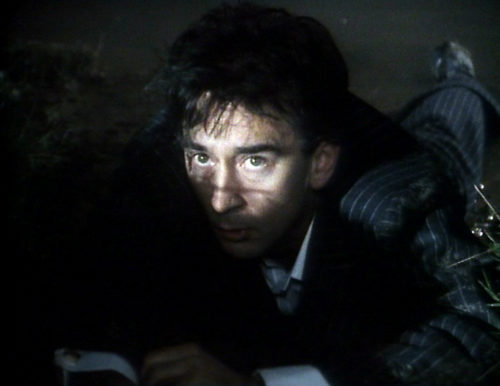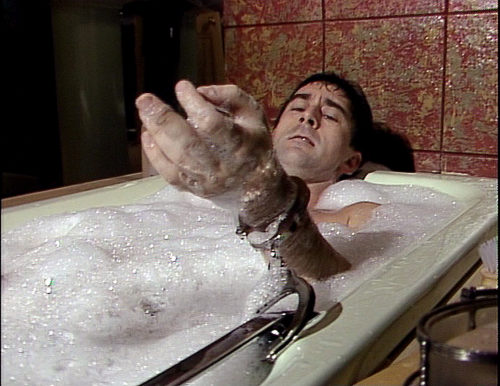Eddie flees out of London to the countryside. On his way he encounters Hugo, a disenchanted spook who helped pin the crime on Eddie but has questions about the entire affair. Looking for answers, Eddie finds himself tangled up in the affairs of the English ruling class—but are any of them what they seem?
About
The second episode of Dead Head, ‘Anything For England’, aired on the 22nd January 1986 on BBC Two. Made in-house at the BBC by Pebble Mill, it was written by Howard Brenton, directed by Rob Walker, and produced by Robin Midgeley. This episode stars Denis Lawson as ‘Eddie Cass’, Lindsay Duncan as ‘Dana Cass’, Simon Callow as ‘Hugo Silver’, George Baker as ‘Eldridge’, James Warwick as ‘Lord Clive Ludlow’ and Tacy Kneale as ‘Sandra’.
Availability: Out on DVD in the UK since 2013. Howard Brenton did a commentary for the first two episodes which serves to illuminate just how it ended up so bizarre.
Anything for England
Last episode, we left Eddie having discovered that the woman’s head he disposed of so nicely in the Thames had been found. Realising he’s not safe, Eddie quickly plots his escape from London, robbing his landlady and taking a train out to the country. Unfortunately, he’s not safe even on the train. He’s being watched.
On the train is Hugo: the spook in the front seat of the car where Eddie got into this mess. Hugo seems to believe that they are both in danger, and leads Eddie to jump from the train to escape from their minder. Eddie and Hugo find themselves in the wilds of the countryside in the dead of night, which Eddie is not happy about.
Hugo handcuffs them together, just to ensure Eddie doesn’t run off. Hugo leads him through the woods to a large country manor, which he breaks into and then disarms the alarm. Hugo rails about how the other half lives, that Eddie stands no chance against the might of England’s heartlands, where the real power lies.
Hugo works for MI5, who have orchestrated the entire plot to frame Eddie. Despite this, Hugo cannot provide answers. He never asked who did the actual crime, only obeyed the order to find someone of lesser value to pin the crime on.
“Every country has its wild men, who’ll do anything, anything at all to preserve the status quo. I’m one of England’s.”
Hugo can confirm one thing. Dana, Eddie’s ex-wife, was a close friend to the murdered girl, and is almost certainly involved with the man who killed her. Eddie responds to this news in predictably fashion: by smashing everything in sight. Hugo attempts to assuage his anger, but Hugo is just as angry. He feels like he’s been forced to turn turncoat by his refusal to let this injustice go, his refusal to stand by while powerful men murder innocent girls and get to frame it on whoever they should so like. So Hugo smashes things as well.
Unfortunately, the Housekeeper swings by. Hugo manages to sweet-talk her out of investigating it any further—with the help of a small monetary bribe. Needing to escape, Hugo steals a car. (From a couple distracted by engaging in some … otherwise more interesting pursuits.) He proceeds to also rob a general store. And then dumps the car.
A quick change of clothes later and Hugo leads them to the village pub, Eddie disguised as his driver. The entire pub is full off the very worst of the English upper class. Eddie is not impressed, at all. One lady, Sandra, takes a particular interest in Eddie—against her better interests, or his—but he isn’t very impressed by her.
Eddie wakes up to find himself handcuffed (by the leg) to a bed in one of Clive Ludlow’s outbuildings. He’s saved—for want of a better word—from boredom by the appearance of Sandra, wearing nothing but an overcoat and some wellington boots. She’s come to claim exactly what she wants from him, namely a good shag. Eddie learns just how much the rich and powerful get away with. Embezzling a million pounds—no problem if you are 49th in line for the throne, as it would be too much of a scandal to prosecute you. Sandra leaves him still tied to the bed, with no real answers to speak of.
Things only get worse. Clive and Hugo appear, completely drunk, believing that torture is the only way to get answers out of Eddie. The following scene is excruciating to watch. And no answers are forthcoming, because Eddie doesn’t have them.
Hugo gives in, and brings Eddie to the main Ludlow Manor, where Eddie lives a life of luxury for about a week. Then, a grand hunt is organised, which Hugo participates in. Looking out the window, Eddie suddenly recognises Dana amongst the participants. Hugo realises that she must have been brought to the Hunt by the man they’re looking for; he’s amongst them.
Eddie isn’t satisfied by that. He rushes out the manor in his dressing gown to chase after her, running across the English countryside and through the woods. Dana gives him some money, and she warns him to stay away from her. But Hugo and Eddie are being followed. Men—spooks, likely, MI5—kill Hugo. Eddie thinks he’s next. But they don’t want him—not yet, anyway.
Eddie flees, taking Dana’s money and disguising himself once again. Completely friendless and alone, where does he go from here?
Verdict
Whilst the episode beginning in flashbacks—sort of a ‘previously on’ moment—isn’t particularly notable to modern viewers, Brenton notes in his commentary that it was unusual for a British drama at the time to do so. Honestly, it’s probably a good thing they put it in. The series is tough enough to follow if you watch all four episodes at once, let alone watching each episode a week apart and not being able to go back to the others for reference.
There’s a notable homoeroticism in the scenes between Eddie and Hugo. Simon Callow, who plays Hugo, came out as gay in 1984, and this is definitely played upon in the series. Eddie immediately assumes Hugo is gay—though Hugo doesn’t confirm that—and rails quite heavily against any actions Hugo makes that would imply Hugo thought the same of Eddie. Like when Hugo drags Eddie into the train bathroom. Or when he tells him: ‘get your trousers off’.
And then there’s the bath scene. Where Eddie ends up handcuffed to the bath. Helpless. When Hugo comes in with a towel to dry him off, Eddie has to go with it—even though being forcibly dried off by Hugo, himself only wearing a bathrobe, is the last thing he wants.
Hugo’s complaining about the perils and hardships of being born into the ruling class—that you are born to serve and to sacrifice and believe in duty above all else—don’t wash particularly well in the political climate of 2019, and I don’t suppose they washed well in 1986 either. Hugo—and the entire upper class depicted here—are caricatures, the imaginings of an upper class by a writer who does not know that world, one that is too fanciful to be true. Almost. It adds to the unreliable narration of the series; Eddie is seeing what he believes, not what is true.
Eddie’s protests that he can’t have been framed by the Establishment, he loves the Establishment, he votes Tory—well. It’s a very familiar tale.
The scenes in the outbuilding—the sex and the torture—are the most controversial in the entire show, and likely the reason the series was never repeated, and why Brenton and Walker didn’t work in mainstream film and tv again for a rather long time. Which was worse is another argument. (The torture, by my mileage, is… rather drastic. It’s very unpleasant to watch. But I suspect that the full-frontal female nudity was a bigger deal.) Eddie is being used, in every sense of the word.
Walker’s unflinching direction style is on full display here. The violence, the horror, are on full display to the viewer. Despite this, there’s an odd quality to the scenes. They’re explicit, almost gratuitous—there’s no good reason for the close ups of the butchering of the pheasant—but there’s no glory in them. It’s never presented as something to celebrate, just a matter of life. Life contains horrors.
Simon Callow really carries this episode. The entire thing is largely a double-act between him and Eddie, two very different characters from very different backgrounds. Answers for Eddie—or the audience—are less than forthcoming, leaving everyone at Hugo’s mercy. But of course, Hugo doesn’t know anything more than we do.
All in all? Between the male and female nudity, the torture, the homoeroticism? It’s plain as day that british audiences—or at least, british producers—were not ready for this sort of TV in 1986. That alone makes it a fascinating watch. It’s both very of its time, and yet, nothing like anything else of its time.
Next time
Eddie runs once again, looking for sanctuary. He finds it in the arms of his old friend Caractacus, who takes him in. But are things too good to be true? Danger lurks around every corner and Eddie should really know by now: he can’t trust anyone. All that next time in Dead Head: The War Room








